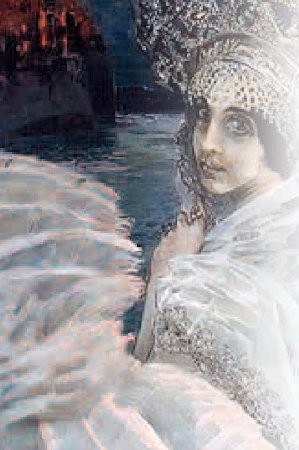This year, for various reasons, we decided not to have a Durham Singers concert at Christmas, and instead we’re trying the idea of having our winter concert in February – next week, in fact. It looks as if it’s a fairly quiet weekend for music in town, so if you’re free please come along.
We have a guest conductor this term – Clare Lawrence-Wills, who used to sing with us, and who is now doing great things as assistant director of Durham Choral Society and of Northern Spirit Singers, and she also put together the programme for this concert, a mixture of French and English a cappella music.
There are some pieces in the programme on obviously wintery themes, such as the defiant Yver vous n’estes qu’un vilain that finishes the set of Debussy songs, or Poulenc’s Quatre motets pour le temps de noël. The dark winter evenings are the time for magic and fairy stories, and when I was thinking about the publicity for this concert, I realised that there was a good dose of that too. Elgar’s My love dwelt in a Northern land is a wonderfully atmospheric and creepy little piece, setting a text by Andrew Lang – he of those wonderful coloured fairy books that I loved as a child. Holst’s I love my love is a folk-style narrative, but one that provoked quite a debate in the pub when we were trying to decide whether it was a straight happy love story, or the product of a deranged imagination.
For me, some of the programme has required me to throw aside some of my musical prejudices, and it’s been an excellent lesson in singing a bit outside the styles I’m most comfortable with. Clare has helped immensely here by leading rehearsals with so much pizazz – her first rehearsal dramatically rescued me from the pit of despair that I tumbled into after St Matthew, and I’m sure I’ve burnt off all the Christmas calories during January’s rehearsals. Even in the subdued pieces, such as Wilbye’s magnificently gloomy madrigals, she demands an energetic intensity from us that lifts even Elgar’s rather dull songs away from any danger of being dirges.
It’s no surprise to me though that the pieces I’m enjoying the most are the Poulenc motets. Videntes Stellam has beautiful, glittery harmonies, and O Magnum Mysterium is now a close second to Victoria for my favourite setting of that text, for it has the same atmosphere of deep reverence and awe. Hodie, Christus Natus est is full of funky rhythms and, like all the others in the set, big dynamic contrasts, and has an absolutely storming opening for the altos. The concert just falls a week outside the end of the church’s Christmas season, but these motets are so good that I’m sure no-one will mind too much.
I’ve had lots of fun working on this programme, and I’m looking forward to the concert – hope to see you there.






